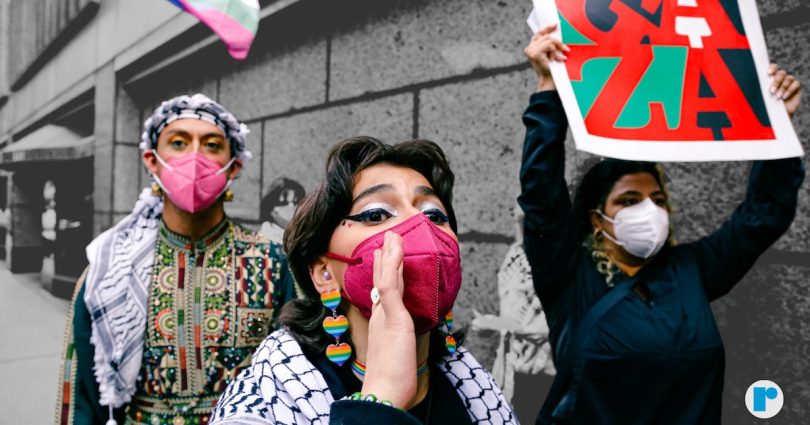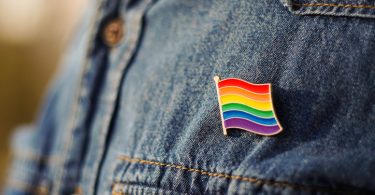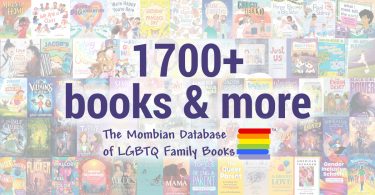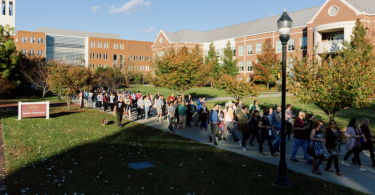Funding for LGBTQ Palestinians have dried up and activists are burnt out. What’s next? Activists are reconciling with uncertain futures as political campaigns divert attention and funds from an additionally vulnerable community of Palestinians. (Alexa B Wilkinson/Alexa B Wilkinson)
In February, Yaffa, a trans indigenous Palestinian poet and activist, helped raise $30,000 for LGBTQ Palestinians. Now, they claim that mutual aid funds have diminished almost entirely since Pride month.
Based in Oakland, Calif., Yaffa, who is disabled and an author to several books, took to Instagram on Aug. 27 to say that as the demand for funds continues to spike, the influx of money has dwindled drastically.
“I have over $60,000 in requests right now, I have three trans Palestinians on the ground in Gaza and I have queer and trans Palestinians in a dozen countries in need of support,” they said in the video. Yaffa described the situation as a sign that LGBTQ Palestinians seemingly don’t exist past Pride month.
Yaffa’s fundraising efforts have been extensive, from donating entire proceeds of their own book sales for evacuation costs to garnering funds through The Muslim Alliance for Sexual & Gender Diversity (MASGD), where they serve as executive director. One notable event on Feb. 24 saw Yaffa partnering with the Queer Ancestors Project (QAP) in San Francisco for a print sale, raising $30,000 from artwork sales alone.
Since Oct. 7, the Palestinian death toll has risen past 40,000, according to Gaza’s Ministry of Health, not counting the bodies buried under rubble. However, a study by The Lancet reveals that the Palestinian death toll could realistically surpass 186,000 people.
During Thursday’s security council meeting, United Nations’ acting emergency relief coordinator Joyce Msuya reported that since last October, over 88% of Gaza’s territory has been subject to evacuation orders. Residents have been forced to flee to areas comprising just 11% of Gaza’s total land. The West Bank, also under Israeli occupation, has become a new target, with three cities attacked in recent weeks.
Palestinians in Gaza have been turning to mutual aid and grassroots fundraising to support one another. For organizers like Yaffa, funneling funds for queer and trans Palestinians doesn’t only harken to the long history between LGBTQ and Palestinian liberation; it’s a matter of taking care of one’s community.
The challenges faced by LGBTQ Palestinian organizers are compounded by a broader crisis affecting Palestinian aid. The United Nations Relief and Works Agency for Palestine Refugees in the Near East (UNRWA), the primary provider of humanitarian assistance in Gaza, has faced severe funding cutbacks following allegations of employee involvement in Hamas attacks.
According to UNRWA in March, more than one million of the 1.4 million Palestinian refugees in the Gaza Strip rely on its food assistance. These funding cuts have significantly impacted UNRWA’s ability to provide essential services, potentially exacerbating the humanitarian situation in Gaza. This context adds urgency to the work of grassroots organizers like Yaffa, who are striving to fill gaps in aid and support for LGBTQ Palestinians.
Presidential election shifts focus from LGBTQ Palestinian aid
While Pride Month brought a surge of donations and visibility towards Palestinians, Yaffa knew from experience that it wouldn’t last.
Donations typically decrease after the month-long surge throughout Pride Month, though this year saw some corporations scaling back their Pride partnerships. For example, Bud Light sales plummeted following a sponsorship with a transgender woman TikTok influencer, while Target stores nationwide downscaled its Pride merch displays. Still, Pride-driven donations tend to be off-shoots in comparison to the rest of the year, and Yaffa’s fundraising efforts saw no exception throughout June.
After Pres. Joe Biden dropped out of the race on July 21, Yaffa observed that many pro-LGBTQ organizations shifted their focus to Harris’ presidential campaign. Harris raised $81 million within the next 24 hours, setting the highest record in American history.
Samer Anabtawi—an assistant professor of comparative politics at the University College London whose research focuses on movements and contentious politics in the Middle East and North Africa, and comparative LGBTQ politics—attests that inequalities in society at large are oftentimes replicated in the realm of fundraising.
“Communities like LGBTIQ+ Palestinians who are at the intersection of multiple marginalized identities, and who are far less likely to have access to traditional support networks may have a harder time with fundraising,” Anabtawihe said. However, the politics of the current presidential election also plays a vital role.
Hannah Moushabeck, a Massachusetts-based second generation Palestinian American and children’s book author, tells Reckon that the major shift of focus from Palestinian suffering to U.S. presidential buzz has been upsetting.
“It’s been disheartening to see people lose focus when the genocide continues to worsen every single day,” said Moushabeck—who is queer—noting that the Harris campaign has thrown a wrench in the momentum of Palestinian solidarity at large, let alone fundraising for LGBTQ Palestinians. “The discourse around Biden, Harris and Trump is not as important to Palestinians on the ground because we recognize that neither the Democrats nor the Republicans have ever really supported Palestinian sovereignty in any meaningful way.”
Leading MASGD, Yaffa mentions also seeing the monetary shift happen with funders of nonprofits, wherein funders who normally fund radical work are instead currently pivoting to try to get Harris into office.
“It’s not as if we were receiving all of that money in the first place, because a lot of it was going into larger organizations anyways, but we would have received the edges of it, which is still a decent enough amount,” they said.
Outside of monetary shifts, Anabtawi tells Reckon that elections generally redirect media attention from other pressing crises. In tandem is “a sharp rise in small campaign donations, often coming from energized voters who view the potential rise of Donald Trump as a serious crisis, and will shift their efforts—physical and monetary—toward the elections,” he said.
Burnout among LGBTQ Palestinian organizers
Organizers’ burnout, according to Yaffa, stems less with the amount of labor and more to do with the cultural politics surrounding Palestinian solidarity. Queer and trans Palestinians like Yaffa and Moushabeck have witnessed a collective discouragement since Harris’ presidential campaign began. They note that mutual aid money has shifted away from their cause, while attention has diverted from Israel’s ongoing attacks on Gaza and the West Bank.
Critics of Harris are split on her stance towards Palestinian activists. Her earlier mention of a ceasefire in Gaza contrasts with her recent DNC speech promising “the most lethal fighting force,” which some interpret as support for U.S. military aid to Israel. Green Party candidate Jill Stein criticized Harris’ “constant flip-flop” on Israel and Palestine, stating, “Kamala and her apologists can’t cover up the blood on her hands with coconut emojis.”
“Kamala and her apologists can’t cover up the blood on her hands with coconut emojis,” Stein wrote on Facebook on Monday. “And there are many other critical, life-or-death issues for the American people that need to be addressed by any serious campaign.”
Moushabeck believes the U.S. has reached a point where Palestinian lives are not recognized as equal to Israeli, American, or white lives. She describes her experience: “We’re met time and time again with excuses, and so burnout for me has looked like losing a lot of hope in my country, in my community, certainly in my politicians and seeking alternative ways of organizing that are outside of those institutions.”
Additionally, Anabtawi stresses that queer and trans Palestinians may also be at greater risk due to war’s history of affecting LGBTQ people and women disproportionately. He adds that broadly, there’s pre-existing palpable anxiety in crowdfunding due concerted efforts to stigmatize Palestinian activism as extremism, which is impacting all crowdfunders as some online crowdfunding platforms have reportedly shut down several fundraising campaigns for Gaza in recent days.
“Palestinians who identify as queer or transgender and who are at risk may not feel safe to be identified publicly, which makes it more likely that those who are raising funds on their behalf will fight an uphill battle trying to get their campaigns attention and credibility, especially when they are competing with so many other campaigns,” Anabtawi said.
The journey ahead needs trans leadership and community
Despite the challenges, Yaffa remains committed to supporting queer and trans Palestinians, though the path forward is far from clear.
“There’s no way to hide and pretend as if everything is fine,” they explained. “Trans Palestinians have done the most deconditioning because we know that these systems don’t serve us well. My vision is to not just center trans Palestinians, but trans Black people and trans indigenous people, too.”
Moushabeck finds hope in the strengthened connections within the LGBTQ Palestinian community. Since Oct. 7, she has connected with fellow LGBTQ Palestinians more than ever before, including Yaffa, forming a chosen family that now spans coast to coast.







